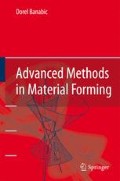Summary
Cost saving and product improvement have always been important goals in the metal forming industry. To achieve these goals, metal forming processes need to be optimised. During the last decades, simulation software based on the Finite Element Method (FEM) has significantly contributed to designing feasible processes more easily. More recently, the possibility of coupling FEM to mathematical optimisation algorithms is offering a very promising opportunity to design optimal metal forming processes instead of only feasible ones. However, which optimisation algorithm to use is still not clear.
In this paper, an optimisation algorithm based on metamodelling techniques is proposed for optimising metal forming processes. The algorithm incorporates nonlinear FEM simulations which can be very time consuming to execute. As an illustration of its capabilities, the proposed algorithm is applied to optimise the internal pressure and axial feeding load paths of a hydroforming process. The product formed by the optimised process outperforms products produced by other, arbitrarily selected load paths. These results indicate the high potential of the proposed algorithm for optimising metal forming processes using time consuming FEM simulations.
Access this chapter
Tax calculation will be finalised at checkout
Purchases are for personal use only
Preview
Unable to display preview. Download preview PDF.
References
Castro, C., António, C., Sousa, L., “Optimisation of shape and process parameters in metal forging using genetic algorithms”, International Journal of Materials Processing Technology, Vol. 146, 356–364, 2004.
Emmerich, M., Giotis, A., Özdemir, M., Bäck, T., Giannakoglou, K., “Metamodel-assisted evolution strategies”, in Proceedings of the International Conference on Parallel Problem Solving from Nature, 2002.
Fourment, L., Do, T., Habbal, A., Bouzaiane, M., “Gradient, non-gradient and hybrid algorithms for optimizing 2D and 3D forging sequences”, in Proceedings of ESAFORM, Cluj-Napoca, Romania, 2005.
Haftka, R., Gürdal, Z., Elements of structural optimization, Kluwer academic publishers, Dordrecht, Netherlands, 3rd ed., 1992, ISBN 0-7923-1504-9.
Jansson, T., Optimization of Sheet Metal Forming Processes, Licentiate thesis, Universitet Linköping, Linköping, Sweden, 2002.
Jansson, T., Andersson, A., Nilsson, L., “Optimization of draw-in for an automotive sheet metal part – an evaluation using surrogate models and response surfaces”, Journal of Materials Processing Technology, Vol. 159, 426–234, 2005.
Kleijnen, J., Sargent, R., “A methodology for fitting and validating metamodels in simulation”, European Journal of Operational Research, Vol. 120, 14–29, 2000.
Kleinermann, J. P., Ponthot, J. P., “Parameter identification and shape/process optimization in metal forming simulation”, Journal of Materials Processing Technology, Vol. 139(1–3), 521–526, 2003.
Kleijnen, J., Van Beers, W., “Application-driven sequential designs for simulation experiments: Kriging metamodelling”, European Journal of Operational Research, submitted in 2004.
Koehler, J., Owen, A., Handbook of Statistics, chap. Computer Experiments, 261–308, Elsevier Science, New York, USA, 1996.
Lin, Z., Juchen, X., Xinyun, W., Guoan, H., “Optimization of die profile for improving die life in the hot extrusion process”, Journal of Materials Processing Technology, Vol. 142(3), 659–664, 2003.
Lophaven, S., Nielsen, H., Søndergaard, J., “Aspects of the MATLAB Toolbox DACE”, Technical Report IMM-REP-2002-13, Technical University of Denmark – Department of Informatics and Mathematical Modelling, Lyngby, Denmark, 2002.
Lophaven, S., Nielsen, H., Søndergaard, J., “DACE – A MATLAB Kriging Toolbox”, Technical Report IMM-TR-2002-12, Technical University of Denmark – Department of Informatics and Mathematical Modelling, Lyngby, Denmark, 2002.
Martin, J., Simpson, T., “A study on the use of Kriging models to approximate deterministic computer models”, in Proceedings of the ASME Design Engineering Technical Conferences DETC, 2003.
McKay, M., Beckman, R., Conover, W., “A comparison of three methods for selecting values of input variables in the analysis of output from a computer code”, Technometrics, Vol. 21, 239–245, 1979.
Myers, R., Montgomery, D., Response Surface Methodology: Process and Product Optimization Using Designed Experiments, John Wiley and Sons, Inc., New York, USA, 2nd ed., 2002, ISBN 0-471-41255-4.
Naceur, H., Guo, Y. Q., Batoz, J. L., Knopf-Lenoir, C., “Optimization of drawbead restraining forces and drawbead design in sheet metal forming process”, International Journal of Mechanical Sciences, Vol. 43(10), 2407–2434, 2001.
Naceur, H., Ben-Elechi, S., Knopf-Lenoir, C., Batoz, J., “Response surface methodology for the design of sheet metal forming parameters to control springback effects using the inverse approach”, in Proceedings of NUMIFORM, Columbus OH, USA, 2004.
Nielsen, H., “DACE, A MATLAB Kriging toolbox”, http://www.imm.dtu.dk/ hbn/dace/.
Papalambros, P. Y., Wilde, D. J., Principles of optimal design, Cambridge University Press, New York, USA, 2000, ISBN 0-521-62727.
Sacks, J., Schiller, S., Welch, W., “Design for computer experiments”, Technometrics, Vol. 31, 41–47, 1989.
Sacks, J., Welch, W., Mitchell, T., Wynn, H., “Design and analysis of computer experiments”, Statistical Science, Vol. 4, 409–423, 1989.
Santner, T., Williams, B., Notz, W., The Design and Analysis of Computer Experiments, Springer-Verlag, New York, USA, 2003, ISBN 0-387-95420-1.
Schenk, O., Hillmann, M., “Optimal design of metal forming die surfaces with evolution strategies”, Computers and Structures, Vol. 82, 1695–1705, 2004.
Simpson, T., Peplinski, J., Koch, P., Allen, J., “Metamodels for computer-based engineering design: Survey and recommendations”, Engineering with Computers, Vol. 17, 129–150, 2001.
van Beers, W., Kleijnen, J., “Kriging interpolation in simulation: A survey”, in R. Ingalls, M. Rossetti, J. Smith, B. Peters, eds., Proceedings of the 2004 Winter Simulation Conference, 2004.
Author information
Authors and Affiliations
Rights and permissions
Copyright information
© 2007 Springer-Verlag Berlin Heidelberg
About this chapter
Cite this chapter
Bonte, M., van den Boogaard, A., Huétink, J. (2007). A Metamodel Based Optimisation Algorithm for Metal Forming Processes. In: Advanced Methods in Material Forming. Springer, Berlin, Heidelberg. https://doi.org/10.1007/3-540-69845-0_4
Download citation
DOI: https://doi.org/10.1007/3-540-69845-0_4
Publisher Name: Springer, Berlin, Heidelberg
Print ISBN: 978-3-540-69844-9
Online ISBN: 978-3-540-69845-6
eBook Packages: EngineeringEngineering (R0)

